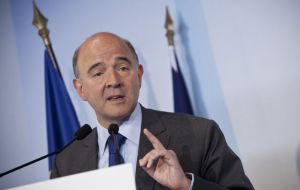MercoPress. South Atlantic News Agency
G-20 rejects a ‘currency war’, but global situation too fragile to confirm it in facts
 “We all agreed on the fact that we refuse to enter any currency war” said French Finance Minister Pierre Moscovici
“We all agreed on the fact that we refuse to enter any currency war” said French Finance Minister Pierre Moscovici The Group of 20 nations declared there would be no 'currency war' and deferred plans to set new debt-cutting targets in an indication of concern about the fragile state of the world economy.
Japan's expansive policies, which have driven down the Yen, escaped criticism in a statement made public in Moscow by financial policymakers from the G20, which groups developed and emerging markets and accounts for 90% of the world economy.
After late night talks, finance ministers and central bankers agreed on wording closer than expected to a joint statement issued last Tuesday by the Group of Seven rich nations backing market-determined exchange rates.
The final version included a G20 commitment to refrain from competitive devaluations and stated monetary policy would be directed at price stability and growth.
“The language has been strengthened since our discussions last night,” Canadian Finance Minister Jim Flaherty told reporters. “It's stronger than it was, but it was quite clear last night that everyone around the table wants to avoid any sort of currency disputes.”
The communiqué did not single out Japan for aggressive monetary and fiscal policies that have seen the Yen drop 20%, a trend that may now continue.
The statement reflected a substantial, but not complete, endorsement of Tuesday's statement by the G7 nations - the United States, Japan, Britain, Canada, France, Germany and Italy.
“We all agreed on the fact that we refuse to enter any currency war,” French Finance Minister Pierre Moscovici told reporters.
The text also contained a commitment to credible medium-term fiscal strategy, but stopped short of setting specific goals.
A debt-cutting pact struck in Toronto in 2010 will expire this year if leaders fail to agree to extend it at a G20 summit of leaders in St Petersburg in September.
European Economic and Monetary Affairs Commissioner Olli Rehn said he expected concrete debt targets to be agreed at the September meeting.
The United States says it is on track to meet its Toronto pledge but argues that the pace of future fiscal consolidation must not snuff out demand. Germany and others are pressing for another round of binding debt-cutting goals.
Backing in the communiqué for the use of domestic monetary policy to support economic recovery reflected the US Federal Reserve's commitment to monetary stimulus through quantitative easing, or QE, to promote recovery and jobs.
QE entails large-scale bond buying -- 85 billion a month in the Fed's case -- that helps economic growth but creates money, much of which has leaked into emerging markets, threatening to destabilise them.
That was offset in the communiqué by a commitment to minimise “negative spillovers” of the resulting financial flows that emerging markets fear may pump up asset bubbles and ruin their export competitiveness.
”Major developed nations (should) pay attention to their monetary policy spillovers,“ Vice Finance Minister Zhu Guangyao was quoted by state news agency Xinhua as saying in Moscow.
”Major developed countries' implementation of excessively relaxed currency policy has an influence on the world economy.“
The G20 put together a huge financial backstop to halt a market meltdown in 2009 but has failed to reach those heights since. At successive meetings, Germany has pressed the United States and others to do more to tackle their debts. Washington in turn has urged Berlin to do more to increase demand.
On currencies, the G20 text reiterated its commitment last November, ”to move more rapidly toward mores market-determined exchange rate systems and exchange rate flexibility to reflect underlying fundamentals, and avoid persistent exchange rate misalignments”.
It said disorderly exchange rate movements and excess volatility in financial flows could harm economic and financial stability.




Top Comments
Disclaimer & comment rules-

-

-

Read all commentsSeriously, is Argentina still in the G20? Seriously?
Feb 17th, 2013 - 08:56 pm 0This is a very complicated situation, most currencys could very well get more competitive by being driven down but if everybody is doing that then it becomes a simple paliative for the crisis.
Feb 18th, 2013 - 05:50 am 0@1
I think it´s :) but don´t see the need to get alarmed over that, after all most countries have a lot more trouble now to be thinking about who is or isn´t part of the G20, but it may need to become more representative in the future IMO.
@1 not for much longer
Feb 18th, 2013 - 09:19 pm 0Commenting for this story is now closed.
If you have a Facebook account, become a fan and comment on our Facebook Page!